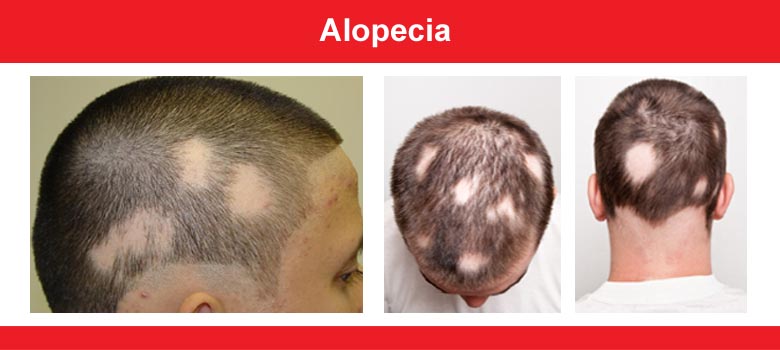
Alopecia areata
Alopecia areata is an autoimmune disorder also known as "spot baldness" that can result in hair loss but it can also spread to the entire scalp (alopecia totalis) or to the entire body (alopecia universalis).
Gradual thinning of hair with age is a natural condition known as involutional alopecia. This is caused by an increasing number of hair follicles switching from the growth.
An unhealthy scalp environment can play a significant role in hair thinning by contributing to miniaturization or causing damage. Air and water pollutants, environmental toxins, conventional styling products and excessive amounts of sebum have the potential to build up on the scalp.
Symptoms of alopecia
Symptoms of alopecia include hair loss in patches usually in circular patterns, dandruff, skin lesions, and scarring. Alopecia areata (mild - medium level) usually shows in unusual hair loss areas e.g. eyebrows, backside of the head or above the ears where usually the male pattern baldness does not effect. In male-pattern hair loss, loss and thinning begin at the temples and the crown and either thins out or falls out. Female-pattern hair loss occurs at the frontal and parietal.
Types of Alopecia
No matter what the type, alopecia areata has always been a cause of mental distress in most cases. However, it is essential to understand the different types to decide the curability of the cases:
Types of Alopecia
- Alopecia areata monolocularis A single bald spot on the scalp marks this condition. It may stay as such or may progress to formation of multiple spots.
- Alopecia areata multilocularis The patient presents with multiple bald spots on the scalp since the onset of the complaint.
- Alopecia totalis:- All the hair on the scalp is lost in this type of alopecia. It is one of the severe forms and constitutes the difficult cases.
- Alopecia universalis When all the hair from all over the body is lost, the condition is called alopecia universalis.
- Alopecia barbae The bald spots are limited only to the beard region in this type.
- Traction alopecia In some patients, due to constant tension on the hair from being tied very tightly, alopecia develops along the frontal and temporal margins of the scalp resulting in traction alopecia.
Causes of Alopecia Areata
Alopecia areata belongs to the category of diseases classified as auto-immune conditions. These are conditions in which the immune system of the body mistakenly attacks the body’s own cells – in this case the hair follicles - and destroys them. This results in hair being lost from the affected area. This abnormal behavior of the immune system can be triggered by a number of factors such as:
Testosterone
High levels of the male hormones (which are present in men as well as in women) can trigger the onset of alopecia
- Disorders of thyroid gland
- Anemia
- Low intake of protein
- Drugs and medications:
- Chemotherapy drugs
- Large doses of Vitamin A
- Oral contraceptive pills
- Antimalarials like Chloroquine
- Beta blockers (used for treating hypertension
- Certain antidepressants
- Anticoagulants
- Chemical treatment of hair
- During recuperation after some major surgery
- Sudden weight loss due to dieting
- Local fungal infection of the scalp
Besides the aforementioned, emotional stress and genetics also play an important role in alopecia areata. A family history of alopecia areata or any other auto-immune diseases is seen in many cases suggesting a role of genetics in causing this disorder.
Treatment for Alopecia areata
Treatment is based on the following factors which lead and maintain the disease:
- Duration of hair loss or Alopecia areata
- Areas affected (scalp, beard, moustache, limbs, other body areas)
- Extent of spread (Small or large; one or multiple spots)
- Previous medication (Extensive use of oral or local cortisone)
- Associated diseases like diabetes & other diseases
Astha clinic's treatment gives the best possible results in treating Alopecia Areata. Dr Rajesh khandelwal & Dr Ranu Gupta has been working on Alopecia Areata for over Eighteen years.Our treatment goes into the roots of the disease and corrects underlying immunity related problems; thereby stimulates hair growth.
Medicines to be applied locally on scalp i.e. herbal heena and oil nourishes hair roots and makes hair root strong and healthy. They also makes a protective layer on scalp to prevent dandruff and hair splitting. Heena is a combination of Reetha, Amla, Bhrangraj and so many more benificial medicines that stops premature graying of hair and makes hair black, shiny, long and healthy.

